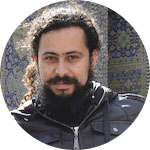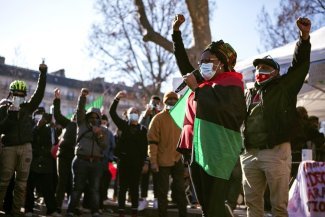
In this picture taken on 3 January 2020 in the Chilean capital city of Santiago de Chile, a protester carries an effigy of the Chilean president Sebastián Piñera in prison garb with bloody hands, while another protester chants “Chile woke up!”
By 3 December 2019, the number of demonstrators reporting serious eye injuries during Chile’s mass protests for a more just society stood at 345. Officers of the Carabineros de Chile (Chile’s national police) fired rounds of pellets into their faces in a premeditated and repeated manner. The figure, provided by the National Human Rights Institute (INDH), has been steadily increasing ever since, a result of the ‘military’ training and instruction received by the Chilean police, an entity that, according to various human rights groups, requires wide-ranging reform.
Reports by national and international organisations including Human Rights Watch, Amnesty International and the United Nations High Commissioner for Human Rights (UNHCHR) detailing the human rights violations that took place in Chile during the ‘state of emergency’ declared in 2019 in response to the protests, have been unequivocal and devastating. They found that the use of force against civilians by the Carabineros and military forces, which took place with the knowledge of the country’s highest authorities, was disproportionate and has gone unpunished.
According to human rights organisations, thousands of people were victims of widespread violence. More than 15,000 people were detained and 11,000 injured in the first three weeks of demonstrations. There were reports of rapes, kidnappings and torture, as well as deaths.
Despite these figures and the serious nature of the accusations, thousands of cases have been closed, and with them the possibility of compensation for the victims and justice for those responsible.
According to sources with access to his inner circle, one of President Sebastián Piñera’s main worries is being tried before an international tribunal for the systematic human rights violations that occurred under his mandate.
“Piñera has been involved in several legal proceedings, mostly related to financial crimes. In Chile and countries like it, when powerful economic interests are involved, these matters are typically resolved through networks of influence, phone calls made by the accused himself, or by those who defend him, through the business and political groups in which he has a leadership role. But he is facing very different accusations now, which he will not be able to make go away with a simple phone call,” says lawyer Mauricio Daza, who together with senator and president of the Senate Human Rights Commission Alejandro Navarro and others have set off on a path to bringing Piñera to trial.
According to Daza, during the protests, known as the estallido social (social outburst) in Chile, “police forces were responsible for repression that went beyond isolated crimes against the civilian population but, in our opinion, also constitutes a crime against humanity since we are dealing with widespread, systematic attacks committed by the police forces against a civilian population. What’s more, political authorities were aware of these circumstances and took no effective actions to stop the repression. We are facing a much more serious situation than individual attacks [because] there was a real pattern of conduct behind police action.”
The actions of the Carabineros, who aimed and shot at people’s faces, were not confined to Santiago de Chile, but were repeated in other regional capitals such as Valparaíso, where police forces similarly acted with excessive violence against the population.
In addition to allegations of torture and rape, people have died under circumstances that have yet to be clarified. “From what I have seen thus far, there is strong evidence to suggest predetermined, systematic action on the part of some state body. So this could be considered a crime against humanity,” says the notable former Spanish judge Baltasar Garzón, who ordered the arrest for General Pinochet in 2012.
Citizens confronted with terror
On 19 October, before a curfew had been imposed in the northern capital of Iquique, a demonstrator named Juan Francisco Alarcón was tortured by civilian and army personnel of the VI division of Iquique, next to a building known as the ‘Pinochet House.’
In an interview with Equal Times, the young man says that he was “tackled, subdued and brought inside the military compound through an access route from the Hotel Granaderos.
“During my detention, I was subjected to different types of torture. Asphyxiation, blows with weapons of war, rehearsed executions, Russian roulette, electrical currents in my legs, blows to my genitals. I was stripped naked, photographed and beaten. They also wanted to have a record of my tattoos. They constantly threatened to kill me and my family, they kept telling me that this was happening to me for ‘getting involved in this nonsense.’” The humiliation and beatings continued until he lost consciousness.
As of 19 November, the Public Prosecutor’s Office reported 26 investigations into “persons killed during social demonstrations”. Alarcón survived, and over the course of the on-going investigation into his case, the following persons were identified among the military personnel on duty at the compound on 19 October: Second Corporals Samuel Valenzuela Garrido and Carlos Ernesto Barraza Tapia; as well as Jorge Luis Bascuñan Molina and José Manuel Díaz Grandón, who could be held responsible for acts of torture, cruel and inhuman treatment, depending on the outcome of the investigation.
“It’s common these days to see that there are two versions [or speeds] of Chilean justice: one criminalises poverty and those of us who fight for a more just and equitable society. This type of justice is very swift despite the absence of hard evidence, often nothing more than a farce designed to give the population the impression of ‘law and order,’ a false and nefarious forced sense of governability.
“But when it comes to prosecuting agents of the state who violate human rights, we see another type of justice that is very slow, inefficient, ineffective and classist,” says Alarcón.
“As with the Pinochet dictatorship, we rely on the support and extensive experience of Judge Garzón and the Chilean Human Rights Commission in order to internationally expose the state’s political violence and the systematic harm done to the Chilean population,” he says.
The awakening of Chile’s citizens took the form of a popular uprising against the current system, against the established regime with its dictatorial heritage, because Chileans believed it maintained inequalities and violated their rights in different aspects of daily life, from housing to health and education (in a country where more than half of workers earn less than US$500 [€412] a month).
Protesters in Chile were fighting for dignity and conducted themselves with a high degree of political civility. Demonstrators used art, posters and media to make clear that they were taking to the streets for profound change.
While Piñera declared “we are at war,” the people expressed their dissatisfaction every day at sundown by beating on their pots and pans.
In a response to Equal Times, the spokesperson for the Agrupación de Familiares y Amigos de personas asesinadas en el marco del estallido (Association of Family and Friends of Those Killed During the Outburst), Juan Rocco, points out that “the popular uprising that occurred in Chile exposed and exacerbated the contradictions at the heart of its institutions, particularly within the judiciary, where we have seen crimes committed by state agents, such as torture and rape, go unpunished. Criminals effectively receive an institutional shield, even in the most prominent cases that occurred during the uprising, such as those of Gustavo Gatica, Jorge Mora and Fabiola Campillai.”
“Never again”
“Sebastián Piñera is without a doubt a criminal, and he makes no effort to prove otherwise. The morning after the murder of Jorge Mora, Piñera was on television congratulating the Carabineros for their work during the uprising. The executive branch has political responsibilities, they have issued guidelines, and they must pay for it. Piñera, [Andrés] Chadwick and [Gonzalo] Blumel should be prosecuted,” says Rocco.
The legal actions that Mauricio Daza is pursuing are directed against President Piñera, his now former ministers Blumel and Chadwick, as well as former director of the Carabineros General Mario Rozas, among others.
According to Daza, the basis of the case is the Rome Statute, which “defines direct responsibility with respect to civilian command, establishing that the perpetrators of this type of crime are precisely the civilian authorities, the military commanders, or those who effectively act as such. This is based on the fact that they had knowledge that these attacks were being committed and did nothing effective to prevent it. That’s what generates criminal responsibility.”
“The mechanisms with which the murderers are protected come from the institutions themselves. It has become clear that they now serve to guarantee that human rights violations go unpunished in our country,” adds Rocco.
The Carabineros continued their unscrupulous practices, and by February 2020, the number of eye injuries caused by pellets had reached 445. And while the rate of incidents has gone down as a result of the Covid-19 pandemic and the ‘demobilisation’ of citizens through a state of emergency, human rights violations have not stopped.
The decision to take Piñera and his civilian, military and police collaborators to the International Criminal Court began to take shape in January 2020, during Baltasar Garzón’s visit to Chile as a guest of the Latin American Human Rights Forum.
One of the main arguments justifying the ICC’s involvement is the closure of some 3,050 cases of human rights violations associated with the demonstrations that began in October 2019 that should have been investigated by the Public Prosecutor’s Office.
The Chilean Human Rights Commission, together with Judge Baltasar Garzón, decided to initiate proceedings before the ICC to put an end to impunity, arguing that: “It should be borne in mind that the aforementioned unlawful acts, defined by article 7 of the Rome Statute, ratified by the Chilean State on 29 June 2009, are fraudulently classified and investigated in Chile as ordinary crimes. This is done deliberately, firstly, to remove them from the jurisdiction of the International Criminal Court, and secondly, to prepare the conditions that would allow for subsequent impunity through the possible application of the statute of limitations, or through the application of possible pardons, amnesties or full stop laws.”
The appeal was finally sent to the ICC in The Hague (Netherlands) on 29 April by the Baltasar Garzón International Foundation, the Chilean Human Rights Commission, the American Association of Jurists and the Centro di Ricerca ed Elaborazione per la Democrazia (CRED). Proceedings are expected to take a long time, as the ICC must first determine the admissibility of the appeal.
The initiative could also set a precedent for the reported police violence taking place in Colombia (under Iván Duque Márquez) since early May against hundreds of citizens, which has followed a pattern similar to that seen Chile in terms of disproportionality and human rights violations.









